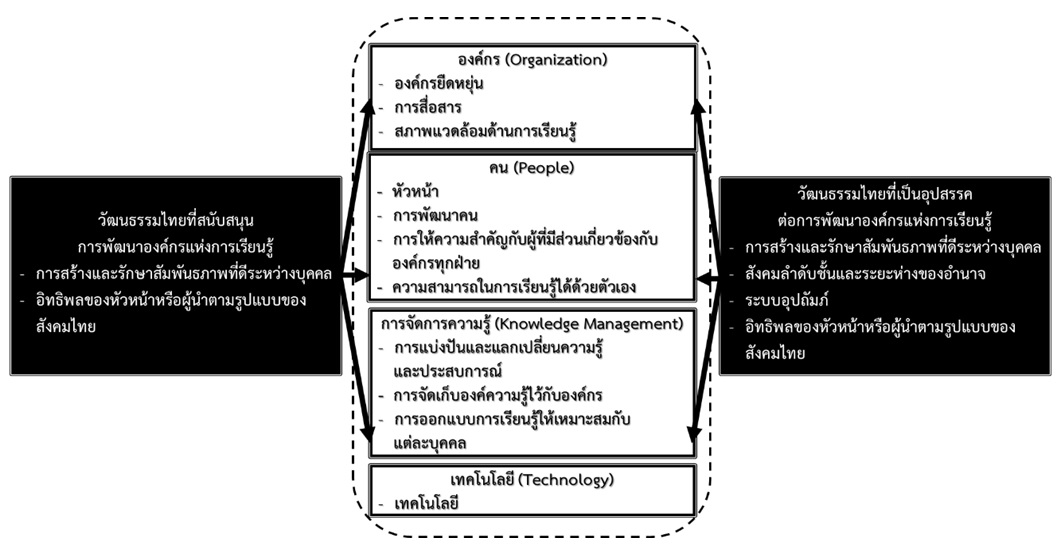THE DEVELOPMENT OF THAI ORGANIZATION TO BECOME A LEARNING ORGANIZATION IN THE CONTEXT OF THAI CULTURE: A GROUNDED THEORY RESEARCH STRATEGY
Main Article Content
Abstract
This research aimed to study about the development of learning organization in Thai organization, obstacles in the development of learning organization, the effect of Thai culture to the development of learning organization and to propose guidelines for the development of learning organization in Thai organization under Thai culture context. This study applied a qualitative research approach and used grounded theory as research strategy. In-depth interviews were conducted until theoretical saturation was reached with 35 samples. All samples are knowledgeable, expert, and experienced personnel having important roles and directly involving in the organizational development in becoming a learning organization.
The research findings demonstrated that the development of learning organization in Thai organization composes of 4 dimensions, i.e. 1) Organization dimension consists of flexible organization, communication, and learning environment, 2) People dimension consists of leader, human resource development, prioritization of all stakeholders, and self-learning capability, 3) Knowledge Management dimension consists of knowledge and experience sharing and exchange, organizational knowledge collection, and the learning design tailored to each individual, and 4) Technology dimension. Moreover, the findings showed that Thai culture can either positively or negatively affect the development of learning organization in Thai organization. Therefore, by applying the concept of learning organization, which was first used in the western world, to Thai organization, it must be understood on the basis of Thai society and culture and to be applied appropriately.
Article Details
References
Bloom, B. D., & Crabtree, B. F. (2006). The Qualitative Research Interview. Medical Education, 40, 314-321.
Creswell, J. W. (2007). Qualitative Inquiry and Research Design: Choosing Among Five Approaches (2nd ed.). Thousand Oaks, California : Sage Publications.
Glaser, B., & Strauss, A. (1967). The Discovery of Grounded Theory: Strategies for Qualitative Research. New York : Aldine de Gruyter.
Gunu, U., & Sanni, H. O. (2016). Impact of Learning Organization on Organizational Survival in Some Selected Nigerian Manufacturing Firms. Asia Pacific Journal of Multidisciplinary Research, 4(4), 28-35.
Hofstede Insights. (n.d.). What about Thailand? Retrieved April 20, 2020 from https://www. hofstede-insights.com/country/thailand/
Hofstede, G., Hofstede, G. J., & Minkov, M. (2010). Cultures and Organizations-Software of the Mild (3rd ed.). New York: McGraw-Hill.
Holmes, H., & Tangtongtavy, S. (2003). Working with the Thais (2nd ed.). Bangkok : White Lotus.
Jamali, D., Sidani, Y., & Zouein, C. (2009). The Learning Organisation: Tracking Progress in a Developing Country-A Comparative Analysis Using the DLOQ. The Learning Organisation, 16(2), 103-121.
Joungtrakul, J. (2010). Qualitative Research: A Tool for Knowledge Creation for National Development. Bangkok : Business Law Center International Company Limited. (In Thai)
Joungtrakul, J. (2017). Research Design in Practices: A Study of Research Design in Research Articles Published in Academic Journals in Thailand. Prae-wa Kalasin Journal of Kalasin University, 4(2), 172-206. (In Thai)
Khesal, S. M., Samadi, B., Musram, H. A. M., & Zohoori, M. (2013). The Impact of Trust on Knowledge Sharing. Interdisciplinary Journal of Contemporary Research in Business, 5(2), 495-501.
Khunsith, A. (2007). The Study of the Effect of Patronage System to the Recruitment and Designation. Organizational Culture: A Case Study of State Enterprise Organization. Retrieved April 20, 2020, from https://www.ocsc.go.th/sites/default/files/document/ research-atinart-2550.pdf (In Thai)
Komin, S. (1990). National Character in the Thai Nine Values Orientations. Retrieved April 19, 2020, from http://www.thaisunset.com/downloads/Suntaree%20Komin%20Thai%20National%20 Character.pdf
Korbuakeaw, T. (2016). The Development of Learning Organization with Process of Knowledge Management on Disseminating Academic Performance of the Teachers via the Internet: A Case Study of Rajavinit Mathayom School. Journal of Graduate Studies, Valaya Alongkorn Rajabhat University, 10(2), 63-74. (In Thai)
Lincoln, Y. S., & Guba, E. G. (1985). Naturalistic Inquiry. Beverly Hills : Sage Publications.
Mack, O., & Jungen, M. (2016). Program Management in VUCA Environments: Theoretical and Pragmatical Thoughts on a Systemic Management of Projects and Programs. In Mack, O., Khare, A., Krämer, A., & Burgartz, T. (Eds.), Managing in a VUCA World (pp. 41-57). London : Springer International Publishing.
Malterud, K., Siersma, V. D., & Guassora, A. D. (2016). Sample Size in Qualitative Interview Studies: Guided by Information Power. Qualitative Health Research, 26(13), 1753-1760.
McNeish, J., & Mann, I. S. (2010). Knowledge Sharing and Trust in Organizations. The IUP Journal of Knowledge Management, 8(1&2), 18-38.
Shenton, A. (2004). Strategies for Ensuring Trustworthiness in Qualitative Research Projects. Education for Information, 22(2), 63-75.
Strauss, A. L., & Corbin, J. M. (1998). Basic of Qualitative Research: Techniques and Procedures for Developing Grounded Theory (2nd ed.). Thousand Oaks : Sage Publications.
Styhre, A., Josephson, P. E., & Knauseder, I. (2006). Organization Learning in Non-writing Communities: The Case of Construction Workers. Management Learning, 37(1), 83-100.
Tufford, L., & Newman, P. (2010). Bracketing in Qualitative Research. Qualitative Social Work, 11(1), 80-96.
Tuohy, T. (2014). Watching the Thais (2nd ed.). Bangkok : Bamboo Sinfonia. (In Thai)
Yodwisitsak, K. (2004). The Implementation of Knowledge Management in Thailand: Through the Barricades. Journal of Business Administration, Thammasat Business Journal, 27(102), 71-86. (In Thai)


